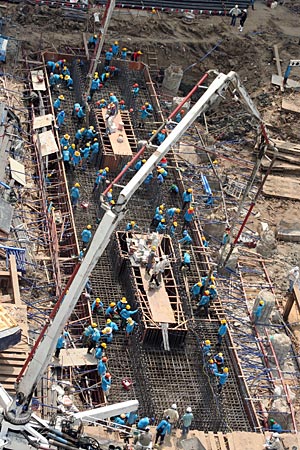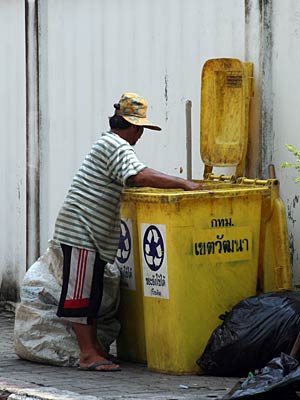Green Bangkok - Environmental Issues
See also : Air Quality in Bangkok and Thailand - Environmental Pollution - Air Quality Monitoring

Construction along Sukhumvit Road : Time to include a spot for trees and greenery.
Greenery around Property Developments
Bangkok is known to have a very limited number of public parks. Fortunately, off the main streets, trees can still be found along the streets and in private properties. However, empty plots are slowly but surely disappearing, with people moving out to the outskirts of the city, and property developers moving in.
A few years back a plan was conceived to entice property developers to include green space in their developments, proportional to the air-conditioning capacity of the constructed buildings. However, this interesting plan died a silent death. Thus, with almost every new building that goes up, the green space around Bangkok is being reduced.
Certainly one has to consider the benefit to the overall environment of planting trees. Even more important is the benefit to children. We think that a lot of present problems (behavioral, obesity) of youngsters are related to being overly constrained when living in a city environment. As such, trees planted should be part of a 'playground' setting, where children can play and run around.
.jpg)
Close to sunset - View of Lake Ratchada and buildings along Ratchadapisek Road.
On a larger scale : Thailand Tobacco Monopoly
The Thailand Tobacco Monopoly occupies a large plot of land between Sukhumvit Road and Rama IV Road. It is located at the back of the even sois along Sukhumvit Road. Part of the ground have been reserved for the Queen Sirikit Convention Center, and more recently for the development of Benjakitti Park around Rachada Lake. Benjakitti Park is a nice start, but most of the area is occupied by the lake, so that in effect the green area along the lake is rather small.
The Thailand Tobacco Monopoly is scheduled to move outside of Bangkok. When cycling around the grounds (a good place for a ride, if you do not mind dogs chasing you), it appears the buildings are mainly used for storage. The move out of Bangkok has been publicized at least since the last two decades, but seems to be an unduly slow process. It is a large area, that demands a useful purpose. Certainly, Benjakitti Park needs to be enlarged. We suggest an area is reserved for sport activities. Instead of yet more hotels or condominiums, if something needs to be built we suggest a sports center and/or a large capacity facility for entertainment events and exhibitions. At present, large convention centers are located actually outside Bangkok (BITEC in Bangna, IMPACT in Nonthaburi). On the other hand, we would not like to see most of the space being converted into a large parking lot.
Recycling Bangkok-style
At our apartment we are kindly asked to deposit our garbage in either a bin for perishable goods, or a bin for plastics, paper, bottles, cans etc. Not quite sure what happens thereafter, since the garbage trucks coming at night, seem to mix everything together again (unless we miss something).
A lot of garbage is actually recycled according to market forces.
There are good incentives to recycle and separate items. Collecting paper and used drinking cans brings some money. The maids (and security personnel) have a good trade collecting these items (and possibly also plastics and bottles) and selling it to 'private' garbage collectors who seem to roam Bangkok's side streets at all times. It is also a common sight in Bangkok to see people actually work the garbage bins to pick out the valuable items. This activity started in earnest after the Asian crisis in 1997 and never subsided, on the contrary. It probably attests to the prevailing rates of poverty in the country, but also to the increased value of recycled goods. So, as a resident of Bangkok, you can take some personal charge, by keeping cans and paper separate from other garbage, and have the local maids take care of it.

A 'garbage' scavenger in our soi (Sukhumvit Road)
Monitoring pollution in Bangkok
You can see daily pollution levels for Bangkok (and Thailand) at the website of Pollution Control Department. Unfortunately no pollution levels seem to be measured along Silom Road or Sukhumvit Road, two areas of interest to foreign visitors. Each time when we visit this site (use the English language links on the right to see the present pollution levels) it looks like things are not looking that bad. Pollution levels are usually measured to be 'moderate'. Our personal impression is that pollution levels have indeed improved when compared to the levels 10 or 15 years ago. One advice, do not linger around below the skytrain platforms. The air is obviously trapped and very foul there, and devices to circulate the air would be very useful.
It's the little things
Environmental concerns are still very minimal or non-existing among Thai consumers, and big shopping malls certainly do not take bold initiatives.
At all possible occasions one is inundated with unnecessary plastic bags. Department stores just recently have started issuing biodegradable plastic bags. They also try to sell reusable bags to customers, and some give minor discounts when you bring your bag (at least at Tops supermarkets).
Besides the obligatory plastic bags, convenience stores and supermarkets will provide you with plastic spoons when you buy a small cup of yoghurt, and straws when you purchase soft drinks or even when you buy beer cans. The default mode is simply giving these items to all customers, so if you are a bit environmentally conscious you have to go around refusing plastic bags and the like every single day.
One example of overly unnecessary 'service' : when you fill a container (plastic) at the salad bar of Siam Paragon's or Emporium's gourmet market, you are provided with paper napkins, and plastic utensils, as if you are going to eat the salad there and then at the supermarket (or do not have the necessary forks and spoons at home).
In conclusion, Bangkok still has a long way to catch up with environmental standards at present common in Western countries.

